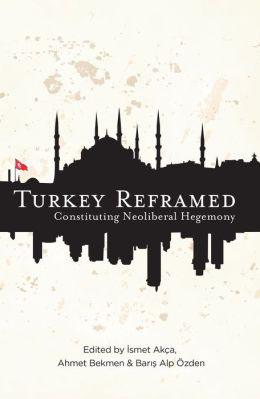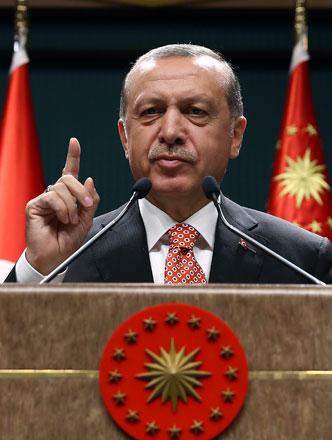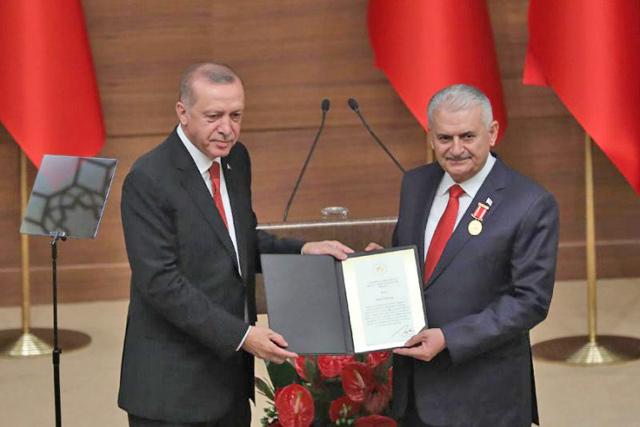You are here
Can the neoliberal state be truly democratic?
By Sally Bland - May 26,2014 - Last updated at May 26,2014

Turkey Reframed: Constituting Neoliberal Hegemony
Edited by Ismet Akca, Ahmet Bekman & Baris Alp Ozden
London: Pluto Press, 2014, 292 pp
The rise to power of the AKP (Justice and Development Party), which had its origins in the Islamist movement, initially elicited much speculation about whether Islam is compatible with democracy. However, the more poignant question posed by “Turkey Reframed” is whether neoliberalism is compatible with democracy — a question with relevance for many countries in the world today. As such, besides providing an incisive analysis of modern Turkey, this book touches on a number of salient issues on the current regional and international scene.
The fifteen contributors, mostly professors at various Turkish universities, concur that “the almost 30-year history of developing a neoliberal hegemony in Turkey reached a state of relative stabilisation during the successive governments of the AKP.” (p. 48) Only shortly before the book’s publication did events challenge this stability, with the outbreak of the Gezi uprising in Taksim Square, blowback from the state’s Syria policy, and growing tension with the AKP’s erstwhile ally, the Gulen movement (which has since erupted into open confrontation). In an afterword, the editors provide a fascinating commentary on the Taksim events, but most of the book focuses on the period following the 1980 military coup—how it paved the way for the AKP’s rise and implementation of the IMF structural adjustment programme after other political forces had failed, decisively putting Turkey on the neoliberal track.
In successive chapters, the contributors explore the factors that allowed the AKP to impose its hegemony, as well as the political, economic and social repercussions of the neoliberal order on Turkey’s state and society. Rather than focusing on the AKP’s piety credentials, they explain how the party gained the allegiance of Turkey’s major capital groups, promoting “Islamic capitalists” in the provinces (the so-called Anatolian Tigers) and integrating them with the Istanbul-based industrial bourgeoisie. Generally, the AKP is judged to be successful in promoting economic growth and expansion, but neoliberal reforms entailed dismantling the former social regime, thus endangering the economic security of the working class and the poor. In this light, “The most significant achievement of the AKP has been to forge a coalition of both the winners and losers of neoliberalism: the rising Anatolian bourgeoisie and the urban poor.” (p. 97)
To this end, the party has pursued diverse strategies combining populism, authoritarianism and conservatism with a neo-Ottoman vision, a new form of nationalism which overlaps with Muslim identity, and widening formal democracy. Yet, while the AKP presents itself as fighting for the people against the old bureaucratic elite, its policies have actually disempowered broad sectors of the population. Inequality and unemployment are on the rise, but the government keeps these social problems off the political agenda, in a paternalistic drive to depoliticise the citizenry. The consensus among the contributors is that the AKP government is becoming more authoritarian. In this sense, its “neoliberal-conservative populism has failed… when confronted with collective and popular protests, it has opted for repressive measures.” (p. 40)
AKP policies are not presented as the only factor in recent developments. Great attention is accorded to how economic factors, whether local or global, set the stage for what the AKP is able to accomplish. Particularly striking is the massive migration to the cities of the 1990s, as farmers were made redundant by the increasing mechanisation of agriculture, and in the case of Kurds, made homeless by the army’s destruction of thousands of villages. These developments radically altered the demography of the working class and of poor urban neighborhoods, fragmenting the working class and minimising the trade unions in a way that made it easier to impose neoliberal measures, like privatisation, ending job security and the widespread use of sub-contracting in industry.
The book includes a brilliant analysis of the effects of neoliberalism on social policy as well as on the media, housing, urban planning and the use of public space. It also explains how religiosity can be used to control workers and other social strata. Last, but not least, is a chapter on grass-roots politics that persuasively argues that the Kurdish movement has become the centre of opposition to AKP rule.
Sally Bland
Related Articles
ISTANBUL —Tens of thousands of supporters of Turkey's ruling and main opposition parties, usually bitter foes, rallied together on Sunday in
ISTANBUL — Turkey’s last prime minister was on Saturday chosen as the ruling party’s mayoral candidate for Istanbul in a bid to ensure the c
ANKARA/ISTANBUL — Turkish President Recep Tayyip Erdogan on Monday cast doubt on results showing his ruling party’s candidate narrowly lost

















